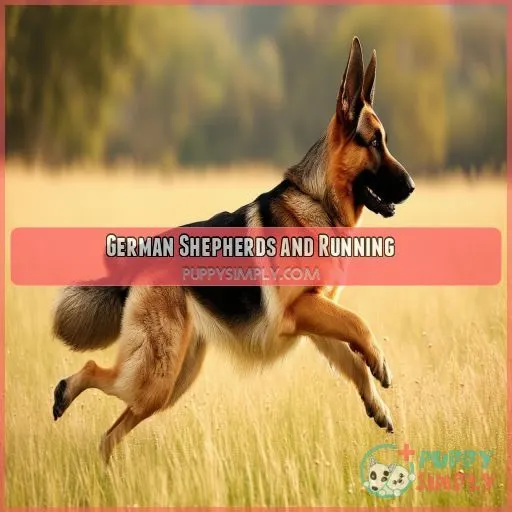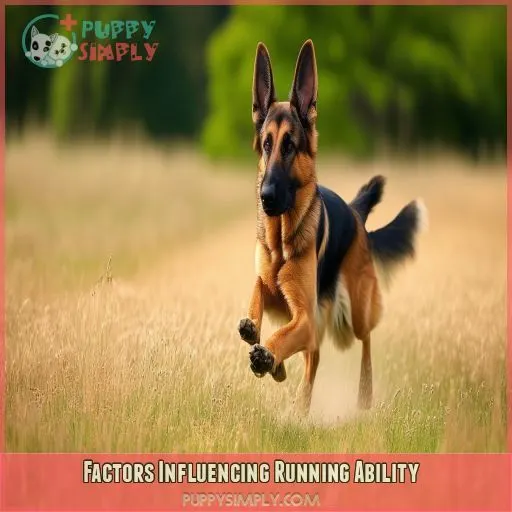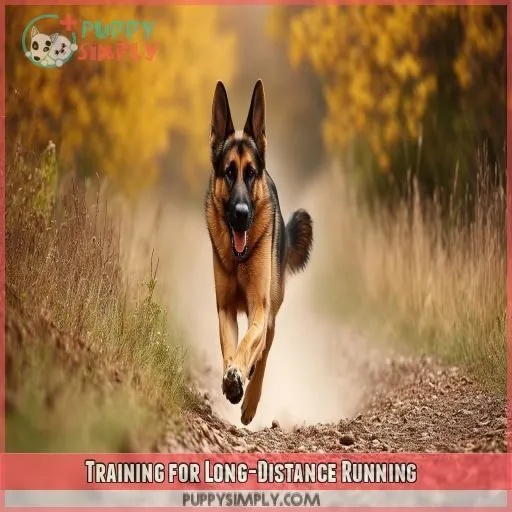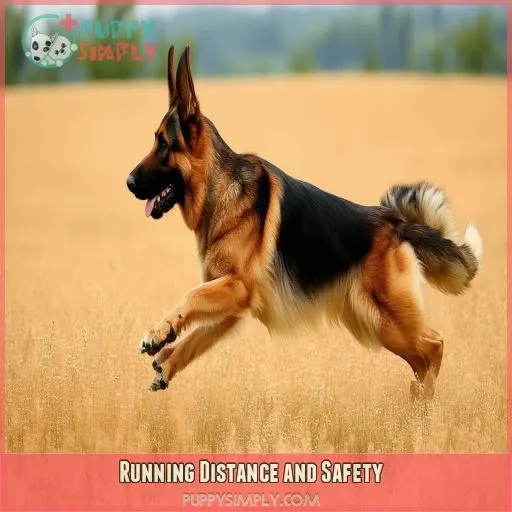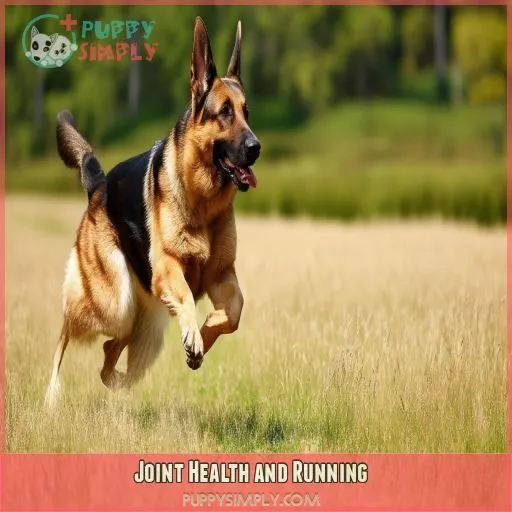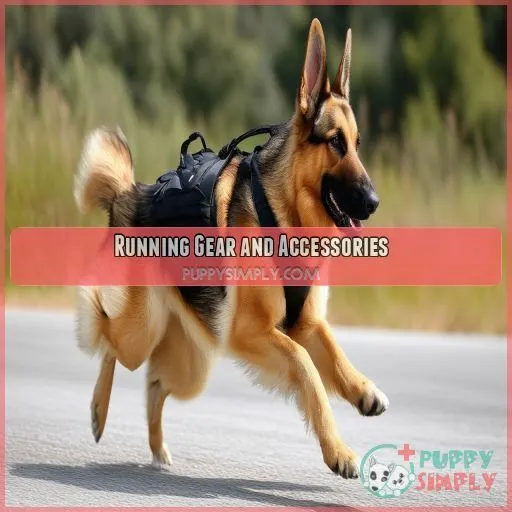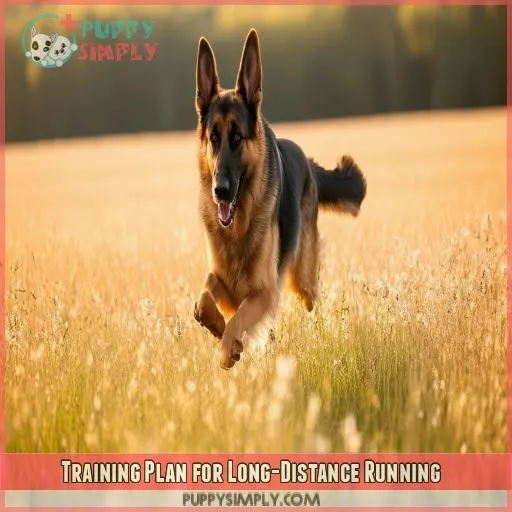This site is supported by our readers. We may earn a commission, at no cost to you, if you purchase through links.
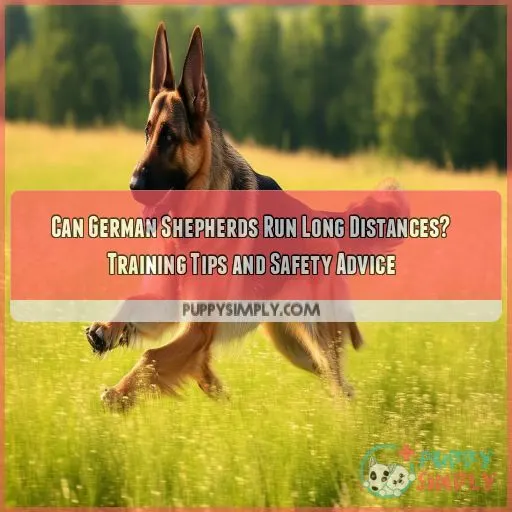 Unleash the terrific running ability of your German Shepherd, as you are about to know if your four-legged friend can run mile after mile. Yes, a German Shepherd is athletic, but can he handle long-distance runs?
Unleash the terrific running ability of your German Shepherd, as you are about to know if your four-legged friend can run mile after mile. Yes, a German Shepherd is athletic, but can he handle long-distance runs?
Now, we will examine what affects their endurance, vital training advice, and critical safety tips. You will learn how to properly condition your dog and keep him healthy, monitoring his health and equipping him for success.
Bring out the best long-distance running in your German Shepherd and unleash a new level of bonding and adventure
Table Of Contents
- Key Takeaways
- Can German Shepherds Run Long Distances?
- German Shepherds and Running
- Factors Influencing Running Ability
- Training for Long-Distance Running
- Running Distance and Safety
- Joint Health and Running
- Running Gear and Accessories
- Hydration and Nutrition for Running
- Training Plan for Long-Distance Running
- Frequently Asked Questions (FAQs)
- How long should a German Shepherd run?
- Is a German Shepherd good for running?
- Can a German Shepherd run a half marathon?
- Can German Shepherds walk long distances?
- How long can a German Shepherd run?
- Can German Shepherds Run a mile a day?
- Are German Shepherds good long-distance running companions?
- How fast do German Shepherds go?
- How does altitude affect a German Shepherds running performance?
- Can German Shepherds participate in ultramarathons with humans?
- Are there specific running techniques for German Shepherds?
- How do different coat types impact running endurance?
- Whats the ideal rest period between long runs?
- Conclusion
Key Takeaways
- German Shepherds are born to run! These athletic pooches can handle long distances like a champ, but remember, Rome wasn’t built in a day. Start slow and build up their endurance gradually.
- Keep your furry friend’s health in check. Regular vet visits, a balanced diet, and proper hydration are the holy trinity of long-distance running success. After all, you wouldn’t enter a marathon fueled by nothing but cheese puffs, would you?
- Gear up for adventure! Invest in a hands-free harness and reflective gear to keep both you and your four-legged running buddy safe and comfortable. It’s like dressing for success, but with more slobber involved.
- Training is key, but so is listening to your pup. Watch for signs of fatigue or discomfort, and don’t push them too hard. Remember, your German Shepherd may be a natural athlete, but they’re not trying to win Olympic gold – they just want to spend quality time with their favorite human
Can German Shepherds Run Long Distances?
Yes, they can be made to run for the longest distance so long as proper training and care accompany the exercise. German Shepherds are athletic dogs that last quite a while, meaning they’ll provide you with a running buddy.
You will need to train them early, at about six months of age, and ramp up the mileage slowly. Keep an eye out for their health concerning age, general health, and joint health. Proper feeding, hydration, and gear should also be provided to ensure they perform and train safely.
Notice their fitness levels and make sure that they are not overworked. With the proper execution, your German Shepherd can very quickly stay with you for a run of up to 10 miles or more with ease.
Read further and learn how to turn your canine into a long-distance running mate
German Shepherds and Running
German Shepherds are natural athletes; they’re full of endurance and agility, capable of performing well over a long distance with appropriate training. Start at a leisurely pace, considering running precautions to prevent early fatigue or possible injury.
They have the kind of stamina that lends them to competitive events in running. That makes German Shepherds perfect companions for joggers or runners while gaining substantial socialization benefits through running that make them well-adjusted and confident.
It would track their exact location and progress. Always ensure your German Shepherd’s paws, joints, and general health are monitored in the best possible way.
Their high energy and build also make them a perfect match with persons who are really into endurance sports or long-distance pursuits. Proper training and care will ensure a rewarding running experience for you and your dog
Factors Influencing Running Ability
The ability to run in a German Shepherd is primarily determined by the factors of age, physical condition, and genetics. If you want him to perform best, make sure he’s fully grown, healthy, and born of a running breed line.
Age and Development
Starting early will, therefore, set the foundation for running dogs successfully.
The German Shepherds’ first training begins at six months. They’re in their prime form a year later.
Take them to the vet for checkups, ensuring that they’re in their perfect state for running long distances.
Add supplements for joints and diet to aid in their development.
Training at the correct developmental points in German Shepherds will have them at the most preferred performance hype
Health and Physical Condition
Consider your German Shepherd’s health and physical condition before long-distance running. Pay attention to these key factors:
- Heat Stroke: Always run during cooler parts of the day.
- Surface Issues: Opt for soft ground to protect their paws.
- Senior Dogs: Adjust the intensity for older dogs, focusing on their speed and agility
Breed and Genetics
Breed and genetics do make a huge difference. German Shepherds were bred to have endurance and stamina, like the Vizslas, Belgian Malinois, Australian Shepherds, and Border Collies.
| Breed | Running Distance | Joint Health |
|---|---|---|
| German Shepherd | up to 10+ miles | Strong, needs care |
Vizsla: 8-10 miles, Generally hardy
Proper hydration and good nutrition enhance performance.
Training for Long-Distance Running
Gradually increase the mileage while training your German Shepherd to run long distances by following exercise regimens to improve his stamina or endurance. Ensure that he’s fed a balanced diet, and if need be, consider seeking professional trainer techniques.
Exercise Regimens
Always warm up and cool down after every run. Mix surfaces—asphalt, grass, or dirt—to help reduce pounding. Modify the pace for seniors and avoid any sprints or exhausting runs during summer. Trail running provides some enrichment as well. For comparative purposes, German Shorthaired Pointers, Dalmatians, and Greyhounds also benefit tremendously from various exercise programs in their long-distance work.
Diet and Nutrition
You will need to feed your German shepherd for long-distance running. Give them as much nutritious food as possible that’s rich in proteins, healthy fats, and complex carbohydrates.
Add supplements that include ingredients suitable for the joints, like glucosamine and chondroitin. Ensure the dog has access to plenty of water before, during, and after the run.
A meal rich in carbs before exercise and a meal rich in protein post-workout ensures that your puppy performs at its best in the excursion and recovers well
Professional Training Techniques
Professional training techniques include heel training, ensuring your German Shepherd stays by your side. Start with a short warm-up run, and use commands like "run," "walk," and "stop" for control. Rewards like treats and affection reinforce good behavior. Don’t forget paw protection, using bag balm or paw wax to keep pads healthy during long distances
Running Distance and Safety
The trick when running long distances with your German Shepherd is to build the mileage up slowly to avoid overexertion. Pay attention to how fit your dog is at all times, monitoring him for excessive panting and lagging so that you can have safe fun while exercising.
Safe Mileage for German Shepherds
German Shepherds can work for distances of 10 miles or more but should be initiated gradually. Increased mileage needs time to gain endurance.
Steady running of about 5 miles, at a pace of 8 minutes per mile, with a long run once a week at 9.5 minutes per mile, would be ideal.
Be sure to monitor your German Shepherd’s health by properly training them for their protection
Monitoring Fitness and Avoiding Overexertion
Be very conscious of your German Shepherd’s fitness. Adopt appropriate training methods and, above all, warm-up periods and cool-down exercises.
Watch for telltale symptoms of overexertion, such as heavy panting or falling behind. Ensure they drink enough water and take recovery strategies like resting after runs.
Begin by understanding the dog’s limitations to avoid overexertion for a healthy running routine that will last a lifetime
Joint Health and Running
For the joint health of your German Shepherd while in a run, make sure first that the dog doesn’t have any kind of underlying issues with its joints, and secondly, be mindful of form and hindquarters at all times. Joint supplements can give additional support during long-distance running.
No Underlying Joint Issues
Always ensure that there’s no underlying joint issue with your German shepherd before running long distances. Regular check-ups at the vet can point out any health implications that should be taken seriously early enough. Running too frequently increases the problems associated with joint issues, so make sure to:
- Following proper training techniques.
- Running frequency monitoring.
- Keeping track of any signs of pain.
- Putting into effect preventive measures of joint care
Monitoring Form and Hindquarters
Keep a close eye on your German Shepherd’s hindquarter gait. Watch for signs of muscle fatigue, like irregular pacing or favoring one leg. Be vigilant about hip and elbow dysplasia, which can affect their running ability. Regular checks will help you catch any issues early, ensuring your dog’s joints stay healthy and their form remains strong
Using Joint Supplements
Consider supplements for joints to support the long-term good health of your German Shepherd.
Strength to joints and prevention from common injuries in the breed—both are some potential benefits that can be derived.
Always be cautious: consult your vet before starting any new
Running Gear and Accessories
An important safety aspect of running with your German Shepherd would be a hands-free harness and reflective collar. Make sure you and your dog are comfortable in your gear, such as in a running belt for water bottles, to help make runs more accessible and more pleasant.
Hands-Free Harnesses
This no-hands running harness offers comfort and convenience for you and your German Shepherd during an uninterrupted run. The waist attachment keeps your hands free, while the secure clip placement controls your dog. This setup is much better for both of you, turning those longer distances into fun and safety with less strain on your arms and hands.
Reflective Collars
Reflective collars are essential safety gear for your German Shepherd, ensuring nighttime visibility. During leash training, incorporate commands and use a reflective collar to enhance safety. These collars help drivers spot your dog during early morning or late evening runs, preventing accidents. Investing in reflective gear keeps you in control and your dog safe in low-light conditions
Comfortable Gear for Both Dog and Owner
On the other side, it’s important for both your sake and that of your furry friend to invest in the right gear. Get light, breathable running shoes with good cushioning and support. Add to this paw-protecting booties and a cooling vest, by which you can escape from the heat. Don’t forget reflective gear for instances when low light is an element. With such equipment, you’re going to be comfortable and safe out on the trails.
- Lightweight running shoes that provide breathability and excellent cushioning.
- Paw-protecting booties for your dogs’ protection of their feet.
- Cooling vest for comfort in warm weather for your pup.
- Reflective gear whenever running in the darkness
Hydration and Nutrition for Running
As a German Shepherd owner, you’ll need to provide your pup with regular water breaks during runs to prevent dehydration. Feeding a highly nutritious diet and incorporating joint health supplements can also support your dog’s long-distance running abilities
Regular Water Breaks
Keeping your German shepherd well-hydrated will prevent the state of dehydration. Provide them with easy access to water bottles, and take water breaks as often as possible, especially in warm weather. Check on the quality of water before giving it to your dog and their hydration needs. Regular water breaks keep them up and running during long jogs.
Highly Nutritious Diet
Generally, your German Shepherd’s performance during a run is as good as the nutritional value of what he eats. Follow feeding guidelines, but most importantly, balanced meals that address dietary restrictions or food allergies.
Go for high protein, specialized diets that will complement their energy demands. Fresh ingredients in meal preparation will ensure optimal health and endurance for those long runs
Dietary Supplements for Joint Health
Add joint supplements to your German Shepherd’s diet for peak running performance. The right ones will promote good joint health, relieve pain, and offer protection from damage during long runs. Consult your vet in terms of the right vitamins or supplements that can help with your dog’s particular needs. Never regard them as an alternative to proper training or care.
Feel the excitement of running with your healthy and pain-free companion.
• Experience the freedom of new trails without having to be concerned about the joints of your dog.
Imagine the satisfaction of knowing you’re giving your pet the best chance for a long and active life.
Training Plan for Long-Distance Running
Most of all, one must have laid down a proper plan to train a German Shepherd for long-distance running. Start with the smallest, most gradual buildup regarding distances and intensities. Here’s a sample training schedule:
| Week | Short Runs | Long Run | Nutrition Focus |
|---|---|---|---|
| 1-2 | 3 x 2 miles | 4 miles | High protein-high intensity diet |
| 3-4 | 3 x 3 miles | 5 miles | Add joint supplements |
| 5-6 | 3 x 4 miles | 7 miles | Increase calorie intake |
| 7-8 | 3 x 5 miles | 9 miles | Hydration strategy |
Run most days for shorter distances, then have one longer run a week. Be sure that the running distance increases gradually up to the goal, and don’t forget to adjust your nutrition plan accordingly. Reach for protein-rich food, and consider even adding supplements good for joints. As the race day draws closer, start easy tapering so your furry friend will be fresh and well-rested. Remember, it’s all about the journey—consistency is what you’re both working toward together!
Frequently Asked Questions (FAQs)
How long should a German Shepherd run?
You can start your German Shepherd with short 15-30 minute runs, gradually increasing to 1-2 hours as their fitness improves. Monitor their behavior and adjust accordingly. Always prioritize your dog’s comfort and health during exercise
Is a German Shepherd good for running?
Like a well-oiled machine, German Shepherds excel at running. You’ll find they’re built for endurance, with stamina that’ll keep you both going. They’re loyal companions who’ll match your pace, making them ideal running partners for active owners
Can a German Shepherd run a half marathon?
Yes, a German Shepherd can be trained to run a half marathon. Gradual progression, building up endurance, and the continuous monitoring of health are required. You’ll need to train together for them to be fit and well-hydrated during the run. Always consult with your vet before embarking on this journey.
Can German Shepherds walk long distances?
Like a tireless wolf, your German Shepherd‘s built for endurance. You’ll find they can walk for miles, mirroring your adventurous spirit. Just pace yourselves, stay hydrated, and watch for signs of fatigue. You’re in for a grand journey together!
How long can a German Shepherd run?
You can train your German Shepherd to run 10+ miles comfortably. Start with shorter distances, gradually increasing over time. Monitor their fitness, hydration, and behavior. Most GSDs can handle regular 5-mile runs at a moderate pace
Can German Shepherds Run a mile a day?
Dedicated dogs, German Shepherds can certainly conquer a mile daily. You’ll find they’re capable of much more. Start slow, build endurance, and watch your furry friend flourish. Remember to warm up, cool down, and monitor their energy levels
Are German Shepherds good long-distance running companions?
Yes, German Shepherds make excellent long-distance running partners. They’re energetic, athletic, and have great endurance. Start slow, build up gradually, and you’ll have a loyal companion for those long runs. Always monitor their health and hydration
How fast do German Shepherds go?
You’ll find German Shepherds can reach speeds of 30-32 mph in short bursts. For sustained running, they’ll comfortably maintain 15-20 mph. Their athletic build and stamina make them excellent running partners for active owners
How does altitude affect a German Shepherds running performance?
Buckle up, buttercup! Altitude’s a game-changer for your German Shepherd’s performance. As you climb higher, the thin air reduces oxygen availability, affecting their endurance. You’ll notice they tire faster and need more breaks. Adjust your expectations accordingly
Can German Shepherds participate in ultramarathons with humans?
You can train your German Shepherd for ultramarathons, but it’s essential to build up the dog’s endurance progress. Start with shorter distances. Observe health. Close monitoring and consultation with your vet are a must. Not all dogs are cut out for such extreme challenges.
Are there specific running techniques for German Shepherds?
Train, pace, and protect your German Shepherd for running success. Use clear commands, start with short distances, and gradually increase. Watch for signs of fatigue, hydrate often, and protect their paws. You’ll both enjoy the journey together
How do different coat types impact running endurance?
Your German Shepherd’s coat type affects their running endurance. Short-coated dogs may overheat faster, while long coats provide insulation. You’ll need to adjust your running routine based on your dog’s specific coat, considering temperature and humidity levels
Whats the ideal rest period between long runs?
Like a well-oiled machine, your German Shepherd needs proper downtime. You’ll want to give your furry friend 48-72 hours between long runs. This rest period allows muscles to recover and prevents overtraining, ensuring peak performance on your next adventure
Conclusion
Your German shepherd will run miles, as sleek and smooth as a well-greased machine. You must, by now, have a better understanding of the basics of training a dog for an endurance run.
Consider the factors of age, health, and genetic predisposition in your dog’s nature. Look after its fitness levels, use proper gear, and feed your pet a healthy diet.
All these tips will unleash your German Shepherd’s hidden running talent over long distances. With patience and dedication, you’ll create a stronger bond and embark on exciting adventures together, mile after mile

